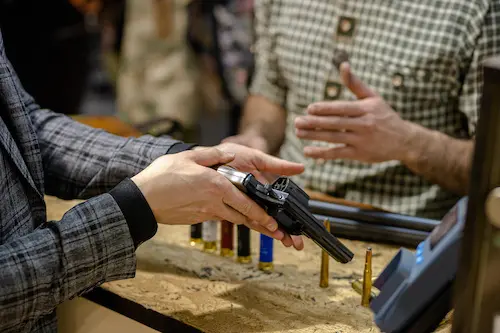Purchasing your first firearm is a significant decision that comes with responsibilities and considerations. Firearm ownership demands an unwavering commitment to safety, legal compliance, and ongoing learning. Whether your goal is self-defense, sport shooting, or hunting, preparing yourself with essential knowledge beforehand can make all the difference.
Tip 1: Research Local and Federal Laws
Before purchasing a firearm, understanding the laws governing firearm ownership and use in your locality and on the federal level is crucial.
- State and Local Laws
Firearm laws can vary significantly across states and even within cities or counties. Research key regulations such as age requirements, registration laws, concealed carry permits, open carry allowances, and storage mandates. Some states may also impose restrictions on specific models or accessories.
- Federal Regulations
Federal laws generally cover the minimum age for firearm purchase, background check requirements, and restrictions on individuals (e.g., those convicted of certain crimes or dealing with mental health issues). The Bureau of Alcohol, Tobacco, Firearms, and Explosives (ATF) is a great resource to understand federal guidelines.
Failing to comply with these laws can result in severe legal consequences. Take the time to research and, if needed, consult local law enforcement or legal experts to clarify any regulations.
Tip 2: Determine Your Needs
Not all firearms serve the same purpose. Before making a purchase, take some time to reflect on why you’re buying a firearm.
- Self-Defense
If protecting yourself and your home is your primary goal, consider handguns or shotguns that are easy to handle in confined spaces. Compact handguns like a 9mm pistol are popular for home defense and concealed carry.
- Sport Shooting
Interested in precision shooting at the range? Opt for firearms designed for sport shooting, such as target pistols or rifles. These guns are built to provide accuracy and performance for recreational use.
- Hunting
For hunting, the choice of firearm largely depends on the type of game you’re pursuing. Shotguns are excellent for bird hunting, while rifles with varying calibers are better suited for larger game like deer or elk.
By defining your objective clearly, you’ll narrow your options and avoid feeling overwhelmed by the myriad of firearms available on the market.
Tip 3: Take a Safety Course
One of the most critical steps for any firearm owner is to prioritize safety. Taking a certified firearm safety course is a must, especially for first-time owners.
- Safety Training Benefits
These courses teach essential topics, including safe firearm handling, loading and unloading procedures, proper storage techniques, and understanding the mechanics of different firearms. The goal is to prevent accidents before they happen.
- Where to Find Courses
Safety courses are often offered through local shooting ranges, firearm retailers, and organizations such as the NRA or USCCA. Many states also mandate completing a firearm safety course before purchasing certain firearms or obtaining a carry permit.
Taking a safety course not only builds your confidence but also emphasizes the importance of responsible ownership.
Tip 4: Choose the Right Firearm
Selecting the right firearm involves more than just picking one that looks appealing. Consider factors such as size, weight, caliber, and ease of use.
- Ergonomics and Comfort
The firearm should fit comfortably in your hands and be manageable to operate. Visit a gun store or shooting range to test different models before purchasing. Some ranges offer rentals so you can try various options to find the best fit.
- Caliber Considerations
Caliber will impact the recoil, ammo cost, and stopping power of the firearm. For first-time buyers, widely used calibers like 9mm or .22LR are a good starting point due to their lower recoil and affordability.
- Online Purchases and Auctions
Many first-time buyers explore buying guns from auction websites. While this can lead to great deals, ensure the platform follows all legal regulations, including shipping the firearm to a licensed dealer for pickup. Research the platform’s reviews and authenticity to avoid scams or unverified sellers.
Selecting the right firearm is a personal decision, and taking the time to explore your options will result in greater satisfaction and usability.
Tip 5: Practice Regularly
Owning a firearm isn’t enough; regular practice is essential for maintaining proficiency and confidence.
- Master Basic Skills
Start by mastering essential skills like proper grip, sight alignment, trigger control, and safe holstering/drawing techniques. Repetition will improve your muscle memory so you become more comfortable and safe during use.
- Join a Shooting Range
Visiting a shooting range is one of the best ways to practice in a controlled environment. Many ranges offer beginner-friendly sessions and expert instruction to help you improve.
- Keep Practicing
Frequent sessions enhance your accuracy and reaction under stress, which is crucial for self-defense scenarios.
Don’t forget to clean and maintain your firearm after practice or extended use. Proper care extends the lifespan and reliability of your investment.
Conclusion
Responsible firearm ownership involves understanding your legal obligations, selecting the right firearm for your needs, committing to safety measures, and maintaining proficiency through regular practice. By following these tips, first-time firearm buyers can lay a strong foundation for safe, responsible ownership while enjoying the benefits firearms can offer.
